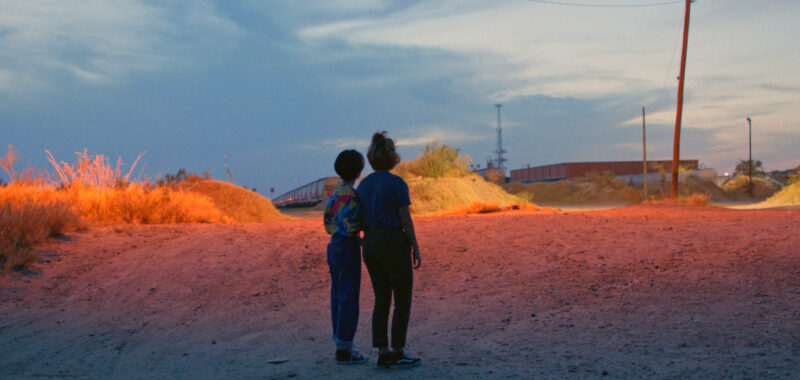Cinematic depictions of the Mexico-US border tend to be justifiably harrowing (Identifying Features, 2022) or unremittingly bleak (Sin Nombre, 2009); portrayals of poor and working-class Americans — from Erin Brockovich to Monster to, yes, the insufferable Hillbilly Elegy — tend to sentimentalize or stigmatize their subjects as heroes or villains. Onscreen representation of working-class, fronterize teenagers is virtually nonexistent unless the youth in question is fleeing their country. In the age of detention centers and bipartisan border panic, ebullience and silliness in this region might seem to be far-flung fantasies, adolescence a mere pitstop on route to a life of economic and cultural struggle.
Thank goodness, then, for Silvia Del Carmen Castaños and Estefanía “Beba” Contreras, the infectious duo behind Hummingbirds, a fronterize coming-of-age documentary as full of whimsy and joy as it is packed with clear-eyed resilience. Filmed during the sticky days and nights of their final summer together in Laredo, Texas, Hummingbirds chronicles the director-protagonists’ last hurrah — as best friends, activists, and creative co-conspirators. “In the streets of Laredo!” the pair bellow to the stars in the opening shot, channeling Johnny Cash with faux gravitas. Setting off the alarm of a parked car whose roof they’ve made a throne, they leap from the vehicle and whoop into the night.

The hottest city in the Lone Star state and one of the poorest in the United States, Laredo is a town of historic grandeur and grievous systemic neglect — neither of which are foregrounded in the film, but are conveyed subtly via setting. Hummingbirds floats through vacant lots, crowded kitchens, bingo halls, bowling alleys, and sun-baked fields. Silvia’s and Beba’s beloved hometown isn’t an eyesore of concrete and dollar stores, but a portal into a shared vision of beauty that they tenderly curate and present onscreen. “Look! Over there, straight over there!” implores Silvia, tattooed wrists holding an iPhone cam above their head in a patch of mesquite. As an aircraft takes off in Mexico, across the Rio Grande, Beba confides that she’s never been on a plane.
Blithely rejecting their town’s conservativism, the duo make their own fun: recording a sister’s Beyonce dance routine on the roof of a downtown high rise, trespassing onto the property of a new home for sale, sneakily changing a neighbor’s yard sign from “Pray to End Abortion” to “Pray for Safe & Legal Abortion.” The delightful, desultory, often rapid-fire dialogue the friends share reveals their zany sensibilities along with sobering trials — of unplanned pregnancy, the early death of a father, and, in Beba’s case, crossing the border on her mother’s shoulders when she was a little girl.
Featuring animation by Laredo-based artist Yensey Murillo and original music by Contreras, Hummingbirds stems from what the directors call a “collaborative apprenticeship model of filmmaking” in which the perspectives of Mexican-American, Tejana, fronterize, women, queer, and nonbinary folks are front and center. “I don’t have a diary. I need to write everything in my head,” narrates Beba midway through the film. “I want to remember last time, this time, and next time. I want to remember it all with no parts missing, because I appreciate even the bad things. I just want people to know that I had fun.” Hummingbirds makes it sparklingly clear how the capacity to revel in life’s highs and lows is itself an act of resistance.

Hummingbirds is currently available to stream through PBS.

